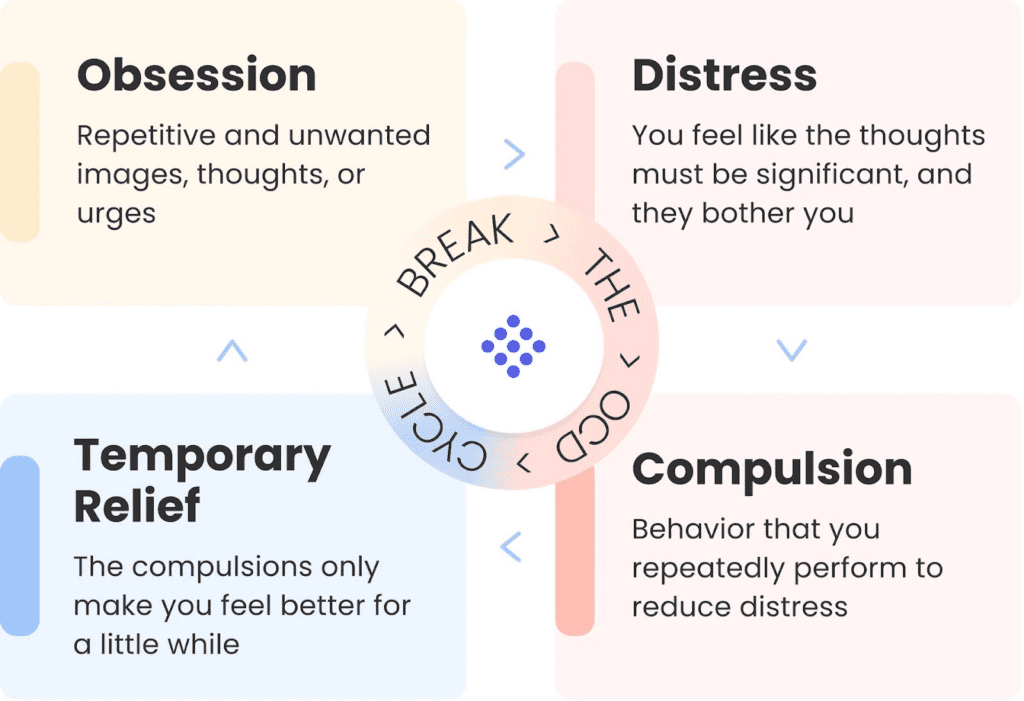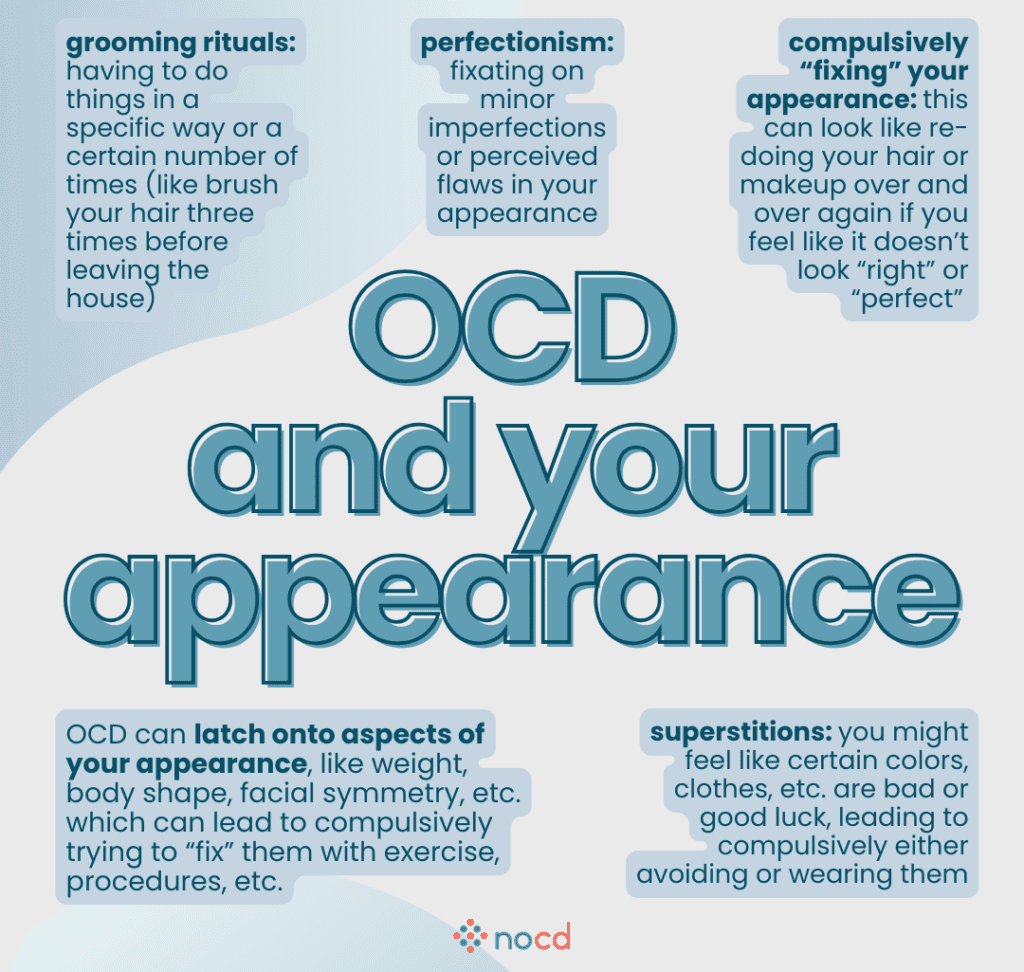Many of us probably have some feature or body part that causes us to feel self-conscious, and it’s normal to feel insecure about our appearance from time to time. Unrealistic beauty standards and the perpetual editing and filtering of photos on social media only add to a culture where we are prone to compare ourselves to others.
But sometimes, a preoccupation with what’s “wrong” with our bodies becomes all too consuming. When intrusive thoughts about your body image persist, they can cause significant distress. When a person is unable to let go of these thoughts, or needs to engage in compulsions to lessen anxiety, then you might wonder if it’s a sign of something bigger at play, like Obsessive-Compulsive Disorder (OCD) or Body Dysmorphic Disorder (BDD).
As a therapist, I’ve seen first-hand how body image intrusive thoughts can impact people’s lives. I’ve also seen what happens when people learn the right treatment and coping strategies. I’m going to provide some more information and guidance on what intrusive thoughts about your body might mean, and what anyone can do to take the power away from them.
What are intrusive thoughts?
Everybody has experienced intrusive thoughts at some point in their life. Intrusive thoughts are unwanted thoughts, urges or images that come into a person’s mind. These thoughts can be disturbing in nature and may even cause significant distress. They’re known as ego-dystonic, meaning that they’re not aligned with a person’s values, desires, identity, or intentions, as opposed to other thoughts.
For people with OCD, not only do intrusive thoughts cause significant distress, but OCD sufferers also differ in how they cope with these intrusive thoughts that come into the mind. A person who does not have OCD might get an intrusive thought about their body and simply let that thought come and go pretty easily. They may have a bit of distress when the intrusive thought presents itself, but they are still able to move on with their life. Somebody with OCD, on the other hand, might have an intrusive thought pertaining to their body image, and they get “stuck.” They attach meaning and significance to their thoughts, and feel an urge to get reassurance about it or get rid of that distress at any cost.
The distress a person with OCD feels after having an intrusive thought about their body and attaching meaning to it will lead them to engage in an action (known as a compulsion) to get rid of the distress they feel. Take a quick look at the OCD cycle to better understand how intrusive thoughts may lead to more behaviors and perpetuate fear.

A person may struggle with thinking their butt is too large, or their eyes are too far apart, or some other perceived flaw. These thoughts cause distress and a person may even engage in compulsions like repetitively checking in the mirror, wearing clothing or makeup to conceal the perceived flaw, or avoidance behaviors—like canceling plans—because they don’t want to be seen by others.
Is it possible to stop having intrusive thoughts about your body?
It is not possible to stop intrusive thoughts entirely. However, as a person works on reducing compulsive behaviors done to reduce their distress, intrusive thoughts may reduce in frequency and intensity over time, because they are no longer reinforcing the OCD cycle. With consistent commitment and practice, response prevention can allow people with OCD to conquer OCD and regain control of their lives, despite doubts or worries related to their body image..
Can intrusive thoughts be a sign of body dysmorphic disorder (BDD)?
A preoccupation with an imagined defect or something you see as a flaw in your appearance could also be what’s called BDD, or Body Dysmorphic Disorder. Now, you might be wondering how BDD differs from OCD. Let’s review the similarities and differences:
Similarities between BDD and OCD
- Both can involve intrusive thoughts that are uncontrollable, unwanted and distressing. These thoughts can cause a high amount of anxiety.
- Both can involve compulsive behavior. These compulsions can include mirror checking, seeking reassurance from family and friends, repetitive behaviors, preoccupation with symmetry and perfection, and avoidance of things that cause more distress.
Differences between BDD and OCD
- OCD can vary in presentation and has many subtypes. Some examples of OCD subtypes are Contamination, Harm, Morality, Sexuality, Perfectionism, and many others. BDD, on the other hand, is centered around body image and body flaws alone, and doesn’t have distinct subtypes.
- Sometimes people with BDD have less insight into their disorder. They truly believe that they have a body flaw, while people who suffer from OCD on some level will know that their worries and obsessions are irrational.
- In OCD, the theme of one’s obsessions may fluctuate widely over time, changing from one topic to the next at different periods. In BDD, one’s body image will remain the focus of their preoccupation and behaviors.
What can I do to cope with intrusive thoughts about my body?
Whether a person is dealing with OCD or BDD, the good news is they are both highly treatable. The gold standard treatment for OCD is a particular form of Cognitive Behavioral Therapy (CBT) called Exposure and Response Prevention (ERP) therapy. This evidence-based treatment has proven to be highly effective in allowing people to manage OCD, and has been validated by decades of clinical research.
ERP is also frequently involved in treatment for BDD, but it is not typically the only form of therapy that is used. People with BDD generally respond well to a varied range of CBT modalities and techniques: ERP, cognitive restructuring, and perceptual training techniques are often used in BDD treatment, and may be supplemented with medication. When people also have a co-occurring Eating Disorder, Family-Based Treatment may also be used.
In ERP, people who struggle with intrusive thoughts and behaviors around their body image can work with their therapist to build an exposure hierarchy: usually an ERP therapist will start with an exposure that is predicted to bring about a low to moderate level of fear and anxiety and work up to the harder exposures as confidence is built. Here are some examples of the types of exposures someone might do in order to overcome intrusive thoughts about their body:
- Writing about the worst-case scenario of being judged for your body and reading it aloud
- Sending a picture to a friend while your skin is “breaking out”
- Purposely engaging in a previously avoided behavior, like walking in public wearing shorts
When engaging in exposure exercises, the goal is always response prevention: your therapist will guide you in resisting the urge to respond to fears and worries about your body by doing compulsions or avoiding triggers. Over time, this allows you to tolerate anxiety and fear related to your body image, without relying on compulsions or avoidance to feel better. This can lead to a greater tolerance for uncertainty and less overall anxiety about your body in the long term.

